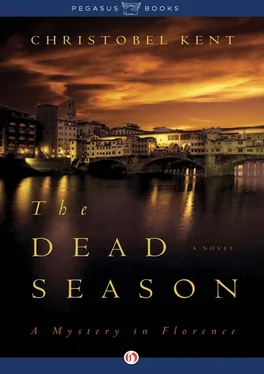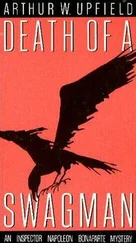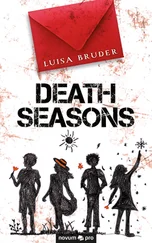Christobel Kent - Dead Season
Здесь есть возможность читать онлайн «Christobel Kent - Dead Season» весь текст электронной книги совершенно бесплатно (целиком полную версию без сокращений). В некоторых случаях можно слушать аудио, скачать через торрент в формате fb2 и присутствует краткое содержание. Год выпуска: 2012, Издательство: Corvus, Жанр: Криминальный детектив, на английском языке. Описание произведения, (предисловие) а так же отзывы посетителей доступны на портале библиотеки ЛибКат.
- Название:Dead Season
- Автор:
- Издательство:Corvus
- Жанр:
- Год:2012
- ISBN:нет данных
- Рейтинг книги:5 / 5. Голосов: 1
-
Избранное:Добавить в избранное
- Отзывы:
-
Ваша оценка:
- 100
- 1
- 2
- 3
- 4
- 5
Dead Season: краткое содержание, описание и аннотация
Предлагаем к чтению аннотацию, описание, краткое содержание или предисловие (зависит от того, что написал сам автор книги «Dead Season»). Если вы не нашли необходимую информацию о книге — напишите в комментариях, мы постараемся отыскать её.
Dead Season — читать онлайн бесплатно полную книгу (весь текст) целиком
Ниже представлен текст книги, разбитый по страницам. Система сохранения места последней прочитанной страницы, позволяет с удобством читать онлайн бесплатно книгу «Dead Season», без необходимости каждый раз заново искать на чём Вы остановились. Поставьте закладку, и сможете в любой момент перейти на страницу, на которой закончили чтение.
Интервал:
Закладка:
Luisa looked from the phone to Serafina Capponi trying to establish some connection, concentrating at the same time on the fact that at least Giuli sounded all right. Alive: herself. On the case, as the girl would say.
‘I’ll call you back,’ said Luisa, a snap decision.
There was something about Capponi’s ancient chimpanzee face, dark eyes staring up at Luisa from under the headscarf, over the gabardine buttoned to the chin. Beppe was looking, bewildered, from Luisa to the new arrival, and back. Then he stepped away, retreating to the haven of menswear up the polished iroko stairs.
‘All right,’ said Giuli, taken aback, and Luisa, like a mother, registered and approved the beginnings of sullenness already checked.
‘Five minutes,’ Luisa said. Giuli hung up first. Luisa turned to the old woman who owned the Loggiata.
‘Signora Capponi.’ Slightly inclined her head, waiting for this unexpected customer to speak.
She wasn’t here to ask for woollen vests and trimming ribbon: the brown eyes examined Luisa intently. There was a movement on the stairs, and Beppe was gone: the old woman put a hand to her chin, loosened the knot in her headscarf, just a little. Luisa spread a hand to indicate the small, velvet-covered footstool where customers sat to try on shoes. Serafina Capponi looked at it with hostility, but she sat. She kept her coat on.
‘She was a good girl,’ she said unexpectedly.
‘Anna? Was?’ Luisa felt a tightening under her ribs at the use of the past tense. ‘Where’s Anna, Signora?’
The woman’s mouth tightened.
‘Serafina?’
It was the name her mother would have called her. Luisa remembered her saying, Hard as nails, Serafina Capponi. No children, and it made her hard as nails . Did it do that to me too, wondered Luisa? She didn’t feel hard, though; she felt as soft and helpless as the inside of a sea anemone.
The old woman’s head turned, slowly, she looked at Luisa as if she hadn’t seen her before, and when she spoke her voice was rusty. ‘It’s a long time since I was last in here,’ she said deliberately. ‘I suppose you have forgotten that I was once one of your respected clients?’
Luisa inclined her head. ‘Not at all,’ she said, truthfully.
‘I remember your mother,’ the old woman said.
‘Yes,’ said Luisa, detecting prevarication. ‘Where’s Anna?’
Serafina Capponi shrugged obstinately, drawing her shrunken shoulders up to her neck like an old tortoise. ‘She was a good girl. I had to protect her from that man. It’s not the money.’
‘What money?’
‘Her parents left her their money — well, adoptive parents, of course she had no real parents. She had them, and now she has me.’
Luisa’s head was hurting with the low glare of the light from outside. ‘Do you know where she’s gone?’
‘He must have been after the money. It was my duty to protect her. He worked in that filthy place.’
The mouth turned down, a waterfall of grimy wrinkles. Capponi’s husband would have been one of the Carnevale’s most loyal customers, in its heyday. So what? All Luisa’s dislike of the place had suddenly fallen away; it was nothing more than a shabby little backstreet cinema. There was more at stake than that. ‘He worked for that bitch. That old bitch.’
And then Luisa leaned forward: she didn’t know if it was more than thirty years with Sandro but something had fine-tuned her to notice such things. That note of venom, that new piece of information. He worked for.. .
‘Who?’ she spoke softly, hardly wanting to alert the woman.
Serafina Capponi’s lip twitched, though Luisa didn’t know if the contempt was for her, or someone else.
‘The old bitch, Margherita Martelli. A dirty business, they tried to hide it, of course they did. Just used her initials for the name of the company, so I believe.’
Luisa stared at her. ‘The edicolaia?’
She was astonished by the sheer, poisonous fluency of the woman who’d sat mumbling at the reception desk in her crumbling, inestimably valuable hotel. Serafina Capponi might be decrepit on the outside, but she’d been all there in the head, all along. It was why you should always treat the elderly with respect, was Luisa’s fleeting thought, though she felt something more ambiguous than respect for the old witch in front of her.
‘Why did you come here, Signora?’ she asked quietly, wanting to separate truth from malice. ‘Why do you come to me, now? Are you worried about Anna?’
Capponi’s chin set, resentful at the directness of the question, and Luisa sensed that like so many of her kind — counting their money, watching their assets decay, fretful over the future and nursing hatreds — Serafina Capponi’s conscience was a dusty, tangled, old spider’s web of contradictions.
‘You came for her, didn’t you? With that husband of yours, that policeman. So he can just find her, if he’s a policeman. That idiot Russian told me she let her go. To him — that place. She must be found, she must be brought back.’
‘A private detective now,’ said Luisa quietly, but Serafina Capponi waved her away impatiently.
Luisa saw that her fondness — if you could call it that — for Anna would be something like her feelings for her ruined and beautiful palazzo: an asset that needed protecting, that threatened to get away from her.
Capponi leaned forwards and whispered, ‘And while your husband is about it, he can make sure everyone knows that Margherita Martelli’s money comes from that dirty cinema. She thinks she can just pocket the cash and come out of it clean?’
So that was why the old woman was here: the need to claw back the only thing that represented a future, Anna and her child, and the need to exact revenge on an old enemy at the same time, for the crime of realizing her assets while Capponi sat and watched hers crumble.
‘She could keep it quiet, she could hide her dirty business, but we know. Those of us who’ve known her since she was a grasping little kid.’ She drew herself up. ‘She can’t even see they are cheating her, all of them, she will never see the real money. Too senile, too soft. The estate agent. Cheating her.’ She pronounced it with contempt. ‘And that boy.’
What boy? Anna’s fiance?
‘She sold it,’ said Luisa. ‘It’s been sold, hasn’t it? The cinema?’
Serafina Capponi’s eyes filmed over, and for an instant Luisa wondered whether she wasn’t gaga after all, if this wasn’t just addled, toxic ramblings, until she saw that crafty glint. All an act.
‘I don’t know,’ said the woman carefully, undoing the top button of her gabardine.
‘You do,’ said Luisa, feeling the ache in her knees and ignoring it.
‘She’s got connections,’ said Serafina Capponi. ‘Old Margerita Martelli has family, you see.’
And glimpsing triumph in the old woman’s eyes, Luisa wondered at the decades of hatred, wondered what ancient feud — a childhood game? A husband led astray? — had provoked this unburdening. She’d waited all this time.
‘Family where?’
The hands were in the lap, the narrow shoulders raised defiantly in an attitude of moral superiority.
‘She needs him, you see. She’s not all there any more, not since that heart attack last year. He deals with everything for her. In the bank.’
‘In the bank.’
‘We know, you see. The young ones, they think they can be invisible, they think there are ways of keeping things from us, with their mobile phones and their computers. But we know.’
‘She has family in the bank?’
And Serafina Capponi’s head turned, her monkey eyes fixing on Luisa.
‘Claudio Brunello was related to her? Margherita Martelli owned the Carnevale and Claudio Brunello managed it for her?’
Читать дальшеИнтервал:
Закладка:
Похожие книги на «Dead Season»
Представляем Вашему вниманию похожие книги на «Dead Season» списком для выбора. Мы отобрали схожую по названию и смыслу литературу в надежде предоставить читателям больше вариантов отыскать новые, интересные, ещё непрочитанные произведения.
Обсуждение, отзывы о книге «Dead Season» и просто собственные мнения читателей. Оставьте ваши комментарии, напишите, что Вы думаете о произведении, его смысле или главных героях. Укажите что конкретно понравилось, а что нет, и почему Вы так считаете.












